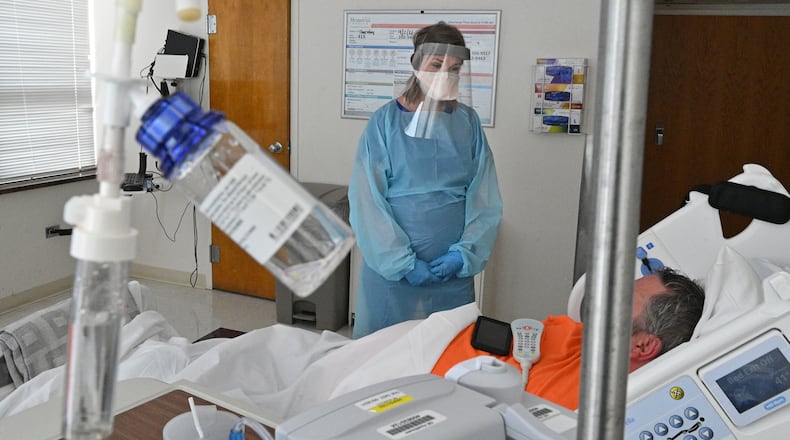The state’s health care system continues to operate in crisis mode. Hospital intensive care units are still overflowing with gravely ill patients, even though COVID-19 admissions have declined since hitting a pandemic peak in early September.
The high demand for critical care has pushed hospitals to try to limit ambulance traffic to their severely crowded emergency rooms. The result: frequent scenes of ambulances piling up outside ERs as emergency medical services workers keep caring for patients on stretchers.
Though the number of COVID-19 cases has edged down, emergency medical and hospital officials said they worry the decline may be temporary. Cases may balloon again over the next few weeks as a result of Labor Day celebrations, the return to in-person school and the start of football season, which often means crowded stadiums.
Here’s a look at major developments over the past week related to COVID-19.
Hospitals still strained significantly
Thursday, Georgia reported 4,103 new confirmed cases of COVID-19, 249 new hospitalization and an additional 174 confirmed deaths.
In hospitals statewide, 5,167 people, nearly a third of all patients, were being treated for COVID-19, according to the Georgia Department of Public Health. That is a drop from the pandemic peak of just more than 6,000 two weeks ago.
But that hasn’t lessened the load in intensive care units, which have to handle the sickest COVID-19 patients along with people critically ill with other ailments. Statewide, intensive care units were at 96% of capacity on Thursday.
Grady Memorial Hospital had to pause some surgeries that could be safely delayed so that its recovery room beds could be converted to intensive-care beds to handle the patient load.
Adding to the stress, every hospital in the state is dealing with staffing shortages, forcing frustrated and exhausted medical personnel to work extra shifts.
Many in the medical community continue to urge Georgians to get vaccinated. “We are still admitting COVID patients every day, and we are still caring for far too many critically ill patients,” said Scott Steiner, CEO of Albany’s Phoebe Putney Health System, which includes a 691-bed flagship hospital. “Don’t be the one who thinks that can’t happen to you.”
Georgia officials: Most COVID-19 outbreaks now in schools
More children are getting sick and spreading the virus.
At a Georgia Department of Public Health board meeting, Dr. Cherie Drenzek, a state epidemiologist, said that about 60% of all COVID-19 outbreaks in Georgia now take place in K-12 schools, with more than 100 school outbreaks so far.
A confirmed outbreak is when there are three or more epidemiologically linked cases.
Compared to previous surges of the pandemic, cases among school-age children have increased seven-fold, she said as she updated the board on hospitalizations, deaths, and the overall trendline of the pandemic.
Credit: Rebecca Wright
Credit: Rebecca Wright
Severe illness from COVID-19 is still uncommon in children. However, enough kids have become infected that pediatric hospitals have been filling up. Federal health data show 381 Georgians under age 18 were hospitalized for COVID-19 in the seven days that ended Sept. 11. That is more than double the number of admissions from the same period a month earlier and nearly 15 times the number hospitalized in the week after the July 4 holiday.
Four Georgia children died in August after contracting the coronavirus, Drenzek said. That was more than in any other month during the pandemic.
Adding to the concerns about the very young: Doctors are still trying to understand the long-term impact of the virus, including Multisystem Inflammatory Syndrome in Children, a rare ailment that’s dogged some kids who have had COVID-19.
Drenzek noted an encouraging slight dip in infections and hospitalizations but said it was too early to know whether the downward trend line will take hold.
Decatur schools plan vaccine mandate
The public schools in Decatur announced they will mandate vaccinations as a condition of employment and are giving teachers and staff until the end of October to get their shots or to secure an exemption.
Decatur Superintendent Maggie Fehrman said last month the school system was drafting a policy that would require vaccination for its nearly 1,000 employees.
Fehrman said, as far as she knows, Decatur would be the first district in the state with such a mandate. The Georgia Department of Education also is unaware of any other district with the same requirement.
Decatur is also considering a mandate for students, but Fehrman offered no timeline for that.
Gov. Brian Kemp denounced the COVID-19 vaccine mandate.
“This clearly violates my executive order banning vaccine mandates by public entities,” he said.
The governor did not indicate whether he was planning any actions against the 5,800-student system.
Staff writers J. Scott Trubey, Ty Tagami and Greg Bluestein contributed to this report.
Keep Reading
The Latest
Featured








